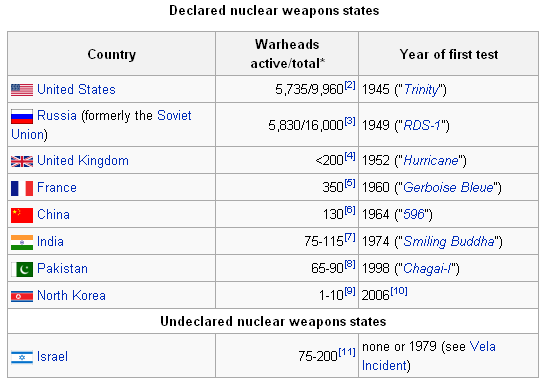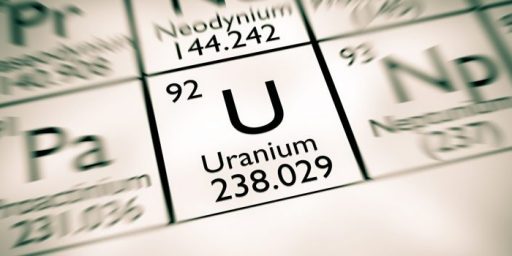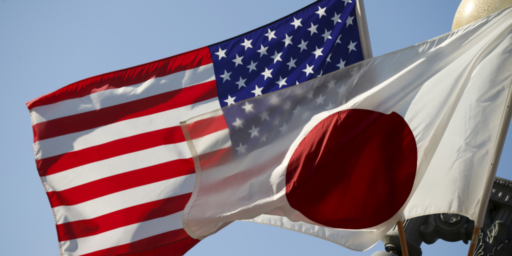The Next Nuclear States
North Korea is the eighth state known have tested a nuclear weapon and, with Israel a presumed possessor, brings the total of nuclear states to nine.

Since every new state’s acquisition creates more pressure for its potential adversaries to join the club, the folks at Foreign Policy magazine thought this would be a good time to speculate on who number ten might be (via Mike Boyer). Its top candidates:
Japan
What it has: Twenty-three tons of weapons-usable plutonium and the ability to produce weapons-grade uranium without much trouble. Sometimes described as a “virtual” nuclear weapons state, Japan has one of the world’s largest and most advanced civilian nuclear programs. It could likely have nuclear weapons within a few months of deciding it wanted them.
Why go nuclear: The only nation ever to have nuclear weapons used against it, Japan has long been staunchly anti-nuclear. But the country has also grown increasingly nervous about what it sees as deteriorating regional security. North Korea’s great leap may tip Japanese public opinion, and some politicians are calling for the country to debate openly whether it should have nukes. The country could withdraw from the Non-Proliferation Treaty with three months’ notice by claiming its “supreme interests” are at risk.
Iran
What it has: No one knows for sure. Most estimates suggest that Iran is five to 10 years away from being able to produce weapons-grade uranium and plutonium. But it has a history of using foreign sources of technology and equipment, as well as the nuclear black market, to pursue those materials. And its expertise has often been underestimated in the past. Its missiles are capable of delivering nuclear warheads to Israel or southern Europe, and it allegedly bought six cruise missiles from Ukraine in 2000 that are designed to carry 200-kiloton nuclear warheads.
Why go nuclear: Iran makes no secret of the fact that it wants to be the preeminent power in the Middle East. And it may be emboldened to accelerate its pursuit of nuclear weapons if North Korea gets only a slap on the wrist for its recent test. Domestically, both conservatives and reformers support their country’s right to develop nuclear technology, and many Iranian military leaders see nukes as a necessary supplement to Iran’s less-advanced conventional forces, which have been hampered by U.S. sanctions.
Taiwan
What it has: As recently as the late 1980s, Taiwan was within a few years of becoming a nuclear-armed state. But the United States and others insisted it back down. Taiwan now has no uranium enrichment capability, and its sole facility for handling plutonium was torn apart. Its weapons-grade remnants likely include fewer than five pounds of plutonium and two tons of uranium. But its scientific know-how has probably survived.
Why go nuclear: As the military balance between China and Taiwan tilts increasingly in the mainland’s favor, Taiwan could decide that it needs nukes to restore equilibrium fast. Like North Korea, Taiwan can argue that it faces an existential threat from a superpower.
Syria
What it has: Most experts don’t believe Syria is attempting to develop nuclear weapons. It did, however, acquire a civilian nuclear reactor from China in 1991 and a light-water reactor from Russia in 1999. The relationship with Russia has fueled speculation that Syria’s nuclear intentions are not pure, as have its missile purchases from North Korea and Pakistan.
Why go nuclear: Perhaps no state is watching developments in Iraq, Iran, and North Korea more closely than Syria. If Iran and North Korea use the threat of nukes to deter the United States, Syria (which suspects it’s in the superpower’s cross hairs) may decide that it has little choice but to follow suit. Syrian leaders are also keeping a close eye on nuclear developments in Egypt and Saudi Arabia. If one or both nations go nuclear, Syria may decide to keep pace.
It’s virtually inevitable that many of these states will “go nuclear” in the coming years. In the case of Japan, or any wealthy industrialized country, the only real obstacle is political desire.






I would add Saudi Arabia to the list. It’s a pretty well known secret the House of Saud wants a deterrent to a nuclear Iran, and the whole AQ Khan episode led to speculations of dealings between Khan and the Saudis, with or without knowledge of the Pak government.
No, it’s a pretty well-hyped fantasy/fear that the KSA wants nuclear weapons. The fact is that Saudi Arabia has been pleading for a nuclear-free Middle East for the past 20 years and has not sought nuclear energy, even for its creaking domestic energy supply.
CSIS has the most recent publication (06/26/06) to discuss the lack of Saudi nuclear aspirations. Take a look at The Gulf Military Forces in an Era of Asymmetric War: Saudi Arabia. It’s a 118-page PDF document. Discussion of nukes is on Page 110.
John, I take your point. It’s one thing to publicly push for a nuclear free ME, but what contingency do they have if and when Iran gets the bomb? Especially if Iraq is partitioned resulting in a Shiite state next door and its own restive Shiite population at home? I dunno, but I’d give the rumors of Saudi nuclear ambitions a bit more creedence given its strategic situation.
Why go nuclear
How in God’s name did ***Foreign Policy*** leave out the most obvious reason for Iran to go nuclear — to protect itself against “regime change” by the U.S.? “Axis of Evil” and all that?
As if we put a Democrat in the White House then all of a sudden these countries will no longer want nukes? Please.
Anderson, I think the primary reason for the Iranian program is still the Israeli nukes. Iran’s ambition to be the leading power in the ME necessitates the nukes to counter the Israeli nuclear threat. Why else are the Israelis all huffy over the Iranian program?
That list should also include South Africa as a former nuclear state since they have admitted to a program, and was suspected of having tested a weapon in the South Atlantic in the 70s, perhaps working with the Israelis.
DCL: Actually, there are numerous former nuclear states if you count the FSU countries that gave them up through negotiation in the 1990s. The Wikipedia article (linked via the chart) lists those.
I was mildly surprised that France has more warheads than the UK, but _China_ only has 130?!? I find that highly difficult to swallow…
Legion – the fact that China only has about 130 warheads is the dirty little secret that those hyping the China threat don’t want you to know. Yes, it’s true. China has about two dozen ICBMs that don’t have warheads on them on a daily basis, and they have no early warning system to know when they are being attacked.
In addition China’s large standing army is mostly useful for putting down domestic disturbances—Chinese ability to project power beyond its borders is quite limited. However, absent a Chinese threat what becomes of a near-peer high-tech threat? What will become of all the generals and DoD bureaucrats who’ve built careers around preparing for that threat?
Anderson, I think the primary reason for the Iranian program is still the Israeli nukes
Conceded. But I would think that after Iraq, we’ve provided an independent justification.